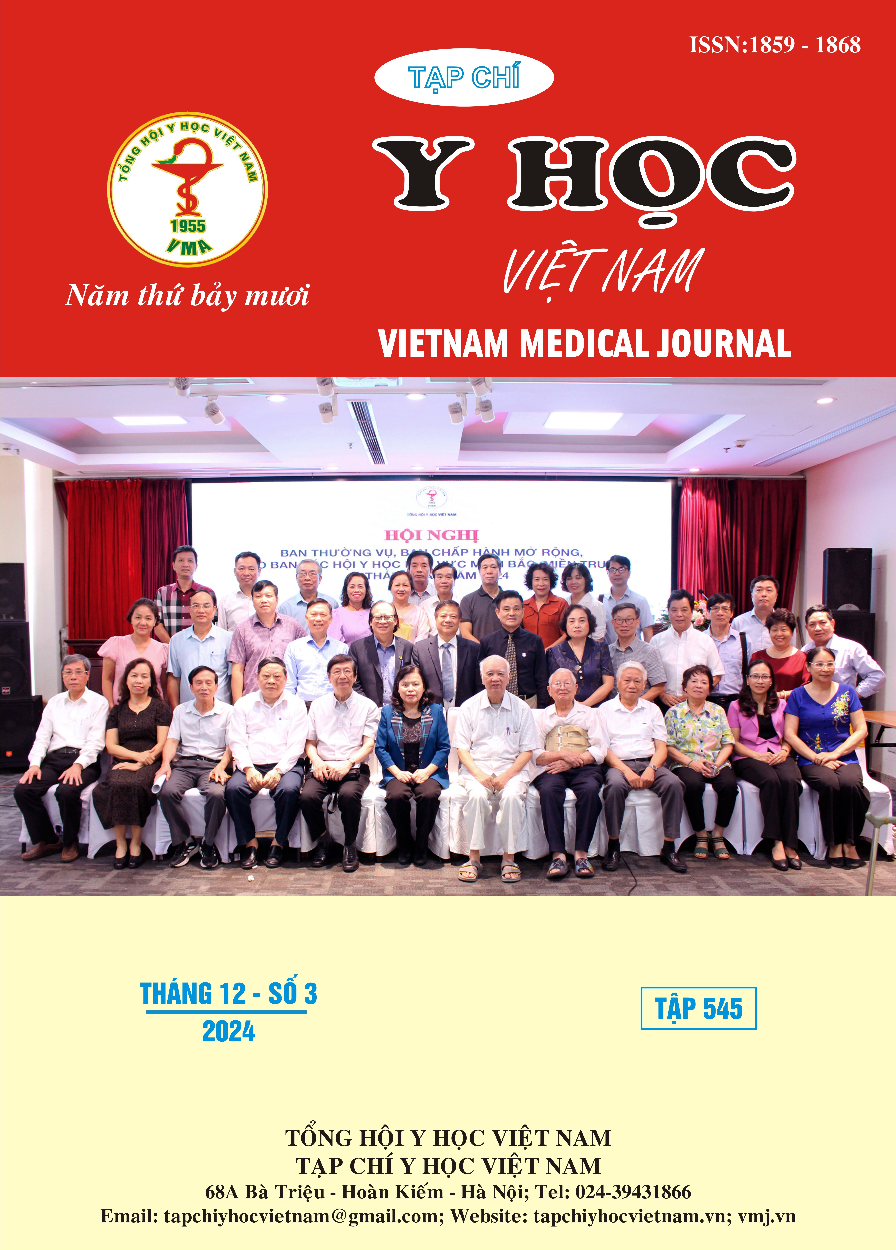TREATMENT OUTCOME OF ENDOSCOPIC SUBMUCOSAL DISSECTION FOR EARLY GASTRIC CANCER TREATMENT AT K HOSPITAL
Main Article Content
Abstract
Objective: To describe some clinical, paraclinical characteristics, endoscopic imaging, and histopathology of early gastric cancer, and to evaluate the results of endoscopic submucosal dissection treatment for early gastric cancer at K Hospital. Patients and Methods: A retrospective and prospective study on 147 patients with early-stage gastric cancer treated with endoscopic submucosal dissection from December 2018 to October 2024 at the Department of Endoscopy and Functional Exploration, K Hospital. Results: Males accounted for 62.6%, with the majority over 60 years old (57.1%). The most common clinical symptom was abdominal pain (72.8%). The tumor was located in the antrum in 86% of cases. Most lesions were ≤ 20mm in size (77.6%). The en bloc resection rate was 100%. The average procedure time was 67.2 minutes (ranging from 20 to 220 minutes). The intra-procedural bleeding rate was 2.0%, with no patients experiencing postoperative bleeding, perforation, or requiring surgical conversion during the procedure. Post-intervention characteristics revealed that most cases had high differentiation (44.2%), followed by moderate differentiation (38.1%). Most patients were in stage Tis (53.1%), with only 8.8% in stage T1b. The disease-free survival rates at 3 and 5 years were 97.2% and 90.5%, respectively. The overall survival rates at 3 and 5 years were 98.7% and 95.7%, respectively. Conclusion: Endoscopic submucosal dissection improves survival outcomes and is a safe treatment option for patients with early-stage gastric cancer.
Article Details
Keywords
Gastric cancer, early stage, Endoscopy submucosa dissection, gastric endoscopy
References
2. Jang JS, Choi SR, Qureshi W, et al. Long-term outcomes of endoscopic submucosal dissection in gastric neoplastic lesions at a single institution in South Korea. Scandinavian Journal of Gastroenterology. 2009;44(11):1315-1322.
3. Bang CS. Long-Term Outcomes of Endoscopic Submucosal Dissection of Undifferentiated-Type Early Gastric Cancer. Clin Endosc. 2021;54(2):143-144.
4. Abdelfatah MM, Barakat M, Ahmad D, et al. Long-term outcomes of endoscopic submucosal dissection versus surgery in early gastric cancer: a systematic review and meta-analysis. Eur J Gastroenterol Hepatol. 2019;31(4):418-424.
5. Fukunaga S, Nagami Y, Shiba M, et al. Long-term prognosis of expanded-indication differentiated-type early gastric cancer treated with endoscopic submucosal dissection or surgery using propensity score analysis. Gastrointest Endosc. 2017;85(1):143-152.
6. Chung IK, Lee JH, Lee SH, et al. Therapeutic outcomes in 1000 cases of endoscopic submucosal dissection for early gastric neoplasms: Korean ESD Study Group multicenter study. Gastrointestinal Endoscopy. 2009; 69(7):1228-1235.
7. Sugimoto T, Okamoto M, Mitsuno Y, et al. Endoscopic Submucosal Dissection is an Effective and Safe Therapy for Early Gastric Neoplasms: A Multicenter Feasible Study. Journal of Clinical Gastroenterology. 2012;46(2).
8. Akasaka T, Nishida T, Tsutsui S, et al. SHORT-TERM OUTCOMES OF ENDOSCOPIC SUBMUCOSAL DISSECTION (ESD) FOR EARLY GASTRIC NEOPLASM: MULTICENTER SURVEY BY OSAKA UNIVERSITY ESD STUDY GROUP. Digestive Endoscopy. 2011;23(1):73-77.
9. Choi MK, Kim GH, Park DY, et al. Long-term outcomes of endoscopic submucosal dissection for early gastric cancer: a single-center experience. Surg Endosc. 2013;27(11):4250-4258.
10. Kosaka T, Endo M, Toya Y, et al. Long-term outcomes of endoscopic submucosal dissection for early gastric cancer: a single-center retrospective study. Dig Endosc. 2014;26(2):183-191.


